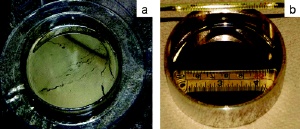Nov 6 2008
Scientists in Canada are reporting progress toward a new type of "liquid mirror" - mirrors made with highly reflective liquids - whose shape can be changed to provide superior optical properties over conventional solid mirrors. The advance could lead to improved instruments for diagnosing eye disease, more powerful telescopes, and other applications, the researchers say. Their research will be described in the November 25 issue of ACS' Chemistry of Materials.
 Magnetically deformable liquid mirrors prepared from silver nanoparticles spread on the surface of ethylene glycol based ferrofluids containing (a) iron oxide nanoparticles coated with citrate and (b) iron oxide nanoparticles coated with MOEEAA. (Image: American Chemical Society)
Magnetically deformable liquid mirrors prepared from silver nanoparticles spread on the surface of ethylene glycol based ferrofluids containing (a) iron oxide nanoparticles coated with citrate and (b) iron oxide nanoparticles coated with MOEEAA. (Image: American Chemical Society)
In the report, Anna Ritcey, Jean-Philippe Dery, and Ermanno Borra note that "liquid mirrors" are not new. Scientists have long recognized that these liquids could provide a low-cost, easy-to-use alternative to solid mirrors for a variety of optical applications while offering the potential for less image distortion. Researchers have recently developed liquid-mirror telescopes that use mercury as the reflective material. Mercury, however, is toxic and the shape of the surface can't be deformed or adjusted.
The scientists describe development of a new type of deformable "liquid mirror" composed of magnetic iron particles, ethylene glycol (a component of automotive antifreeze), and a coating of silver nanoparticles. These materials form a highly reflective mirror whose shape can be changed by adjusting the voltage applied to electromagnets placed below the liquid, allowing the user to fine-tune the mirror's optical properties. In lab studies, the new material showed better reflectivity and stability than current liquid-mirror materials, the scientists say.